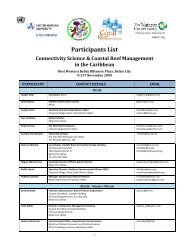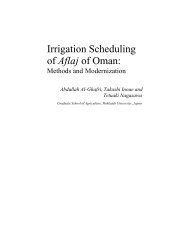The Global Water Crisis: Addressing an Urgent Security - Unu-inweh ...
The Global Water Crisis: Addressing an Urgent Security - Unu-inweh ...
The Global Water Crisis: Addressing an Urgent Security - Unu-inweh ...
You also want an ePaper? Increase the reach of your titles
YUMPU automatically turns print PDFs into web optimized ePapers that Google loves.
y its interconnection to encompass the m<strong>an</strong>agement of forests <strong>an</strong>d of the territory. For this reason, integrated measures were<br />
proposed sp<strong>an</strong>ning both productive projects, such as forestry, crop diversification for self-consumption <strong>an</strong>d commercialization,<br />
development of org<strong>an</strong>ic agriculture, establishment of domestic <strong>an</strong>d collective greenhouses, t<strong>an</strong>k building for aquaculture, <strong>an</strong>d<br />
husb<strong>an</strong>dry of small livestock, to communitari<strong>an</strong> projects such as improving water supply <strong>an</strong>d quality, building of distribution<br />
t<strong>an</strong>ks, sewage, dry latrines <strong>an</strong>d paving, among others.<br />
In response to the indigenous people’s mobilizations <strong>an</strong>d political pressure, the National Commission of <strong>Water</strong> <strong>an</strong>d the government<br />
of the state of Mexico acted towards satisfying part of the dem<strong>an</strong>ds. A convention was signed between the government ministry<br />
<strong>an</strong>d the Mazahua movement to aid the realization of several social projects, but these c<strong>an</strong> be characterized more as short-term<br />
‘b<strong>an</strong>d-aid measures’, such as the building of piped water distribution <strong>an</strong>d sewage networks <strong>an</strong>d of dry latrines. <strong>The</strong> problem<br />
is that several Mazahua communities were either excluded or only partially covered because of political divergence between<br />
groups due to the strategy of the state to weaken <strong>an</strong>d fragment the social movement.<br />
However, despite their exclusion from economic aid from the state, the perspective of the Mazahua Women’s Movement since<br />
2006 has not centered on the actions of the state, but instead has given impulse to self-m<strong>an</strong>aged regional development based<br />
on principles such as integrated m<strong>an</strong>agement of the territory <strong>an</strong>d its natural resources, the strengthening <strong>an</strong>d diversification<br />
of agriculture for food production <strong>an</strong>d for improving the diet <strong>an</strong>d nutritional level of the population, <strong>an</strong>d the conservation<br />
<strong>an</strong>d protection of the sources of water <strong>an</strong>d of their forests in order to guar<strong>an</strong>tee the quality <strong>an</strong>d qu<strong>an</strong>tity of water for present<br />
<strong>an</strong>d future Mazahua peoples.<br />
Conclusions<br />
<strong>Water</strong> has played a primordial role in the pattern of hum<strong>an</strong> settlement, productive strategies, <strong>an</strong>d development of indigenous<br />
peoples in Latin America. <strong>The</strong> socio-cultural value of water is expressed through the various cosmo-visions, myths, perceptions<br />
<strong>an</strong>d archetypes connecting the indigenous peoples with a sacred <strong>an</strong>d divine origin. For Mesoameric<strong>an</strong> <strong>an</strong>d Ande<strong>an</strong> cultures,<br />
water was a gift from the gods that must be cared for <strong>an</strong>d earned through rituals <strong>an</strong>d practices of use <strong>an</strong>d appropriation that<br />
were supported by a bal<strong>an</strong>ce of respect <strong>an</strong>d integration with nature.<br />
<strong>Water</strong> rights arose in a socio-cultural <strong>an</strong>d ecological context that was founded on the concept of belonging to a territory: the<br />
notion of water as a collective good <strong>an</strong>d the respect for social agreements for its m<strong>an</strong>agement were the normative bases of<br />
the uses <strong>an</strong>d customs of indigenous peoples. At the same time, it was <strong>an</strong> adaptation mech<strong>an</strong>ism used by indigenous peoples<br />
in ecological settings with difficult climatic conditions <strong>an</strong>d water scarcity (such as in the Andes <strong>an</strong>d in the arid zones in Mexico).<br />
Until today, there are indigenous regions in Latin America in which cosmo-vision <strong>an</strong>d socio-cultural strategies persist, <strong>an</strong>d in<br />
which, for centuries, a culture of sustainable m<strong>an</strong>agement of water has been generated <strong>an</strong>d adapted, having as its principle<br />
the collective rights <strong>an</strong>d the communitari<strong>an</strong> m<strong>an</strong>agement of the territory with its associated natural resources.<br />
However, in recent years, due to state reforms <strong>an</strong>d ch<strong>an</strong>ges in the economic model that privilege private property <strong>an</strong>d free<br />
markets, the socio-cultural valuation of water has been replaced or even <strong>an</strong>nulated by <strong>an</strong> economic valuation. In other words,<br />
during the recent neo-liberal period, water has tended to lose its integrated me<strong>an</strong>ing to become a merch<strong>an</strong>dise having <strong>an</strong><br />
economic value <strong>an</strong>d a price, a trend which finds support in legal <strong>an</strong>d institutional reforms made by the state regarding access,<br />
appropriation <strong>an</strong>d m<strong>an</strong>agement of the resource.<br />
Resist<strong>an</strong>ce <strong>an</strong>d disputes for the defense of water as a common good with regulated access <strong>an</strong>d free <strong>an</strong>d collective beneficial<br />
ownership have occurred in Latin America. Unfortunately, the ch<strong>an</strong>nels for negotiation <strong>an</strong>d m<strong>an</strong>agement of the conflict have<br />
closed as a result of the new legislation <strong>an</strong>d water policies that have directly affected the rights of indigenous people, with the<br />
clearest expression of these being the privatization of water rights <strong>an</strong>d l<strong>an</strong>d in their territories.<br />
In order to find mech<strong>an</strong>isms to avoid <strong>an</strong>d resolve m<strong>an</strong>y of the socio-environmental conflicts associated with water that exist<br />
today in the indigenous communities of Latin America, the following are required, among other things: i) going beyond the<br />
economic vision of water resources <strong>an</strong>d revaluing its social <strong>an</strong>d cultural import<strong>an</strong>ce for the indigenous peoples; ii) rethinking<br />
novel schemes of water m<strong>an</strong>agement in the indigenous territories, such as co-m<strong>an</strong>agement <strong>an</strong>d decentralized m<strong>an</strong>agement;<br />
iii) recognizing the water rights of the indigenous peoples as a form of legal pluralism or co-existence of state laws with the<br />
consuetudinary right; <strong>an</strong>d iv) linking the legislation <strong>an</strong>d national policies of international commitments about hum<strong>an</strong> rights<br />
with indigenous rights.<br />
Access to <strong>Water</strong> <strong>an</strong>d Conflict: An Indigenous Perspective from Latin America<br />
Part 3<br />
147




